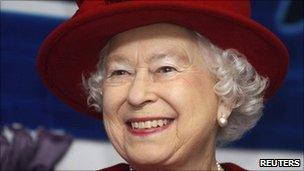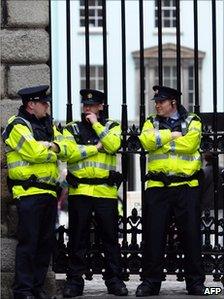Queen on first state visit to Republic of Ireland
- Published

The Queen will make a speech at a state dinner at Dublin Castle
The Queen is set to begin the first visit to the Republic of Ireland by a British monarch.
One of the biggest security operations ever mounted in the Republic is under way for the four-day trip, amid a rise in dissident republican violence.
The Irish army has made safe a pipe bomb found on a passenger bus bound for Dublin. A bomb threat to London made on Sunday was earlier investigated.
President Mary McAleese will formally welcome the Queen at her Dublin home.
King George V was the last reigning monarch to visit the country, in 1911, when what is now the Republic was then part of the UK.
The Queen was invited to visit by President McAleese, who will formally welcome the monarch at Aras an Uachtarain, her home in Dublin's Phoenix Park.
The president told state broadcaster RTE it was "an extraordinary moment in Irish history - a phenomenal sign and signal of the success of the peace process and absolutely the right moment for us to welcome onto Irish soil Her Majesty the Queen".
Mrs McAleese said the two countries were "forging a new future - a future very, very different from the past, on very different terms from the past - and I think the visit will send the message that we are, both jurisdictions, determined to make the future a much, much better place."
UK Prime Minister David Cameron said: "One hundred years on from the last time a British monarch visited Ireland, I think there is a great sense of history and occasion."
He added: "I think the real effect... will be a marker that just as we are solving some of the problems there have been between us in the past, just as we are helping each other through these difficult economic times, now is a great moment for people in Britain and people in Ireland to remember what it is we share."
Mr Cameron will join the Queen and Duke of Edinburgh for part of their trip on Wednesday, while Foreign Secretary William Hague will follow the usual practice of accompanying the royals throughout their visit.
The Queen will attend events at Trinity College Dublin, the National War Memorial Gardens in Islandbridge and Croke Park stadium.
Croke Park is the home of Gaelic games where in 1920, during the Irish War of Independence, British forces fired into the crowd at a football match, killing 14 spectators and players.
The Queen is also to make a speech at a state dinner at Dublin Castle.
What do the people of Dublin think about the royal visit?
There are plans for the Queen and Prince Philip to visit the Irish National Stud in County Kildare, as well as the Rock of Cashel in County Tipperary and a technology park in Cork.
Former prime minister Sir John Major, who helped to establish the Northern Ireland peace process in the early 1990s, said the Queen's visit would "put a seal" on the relationship between the UK and the Republic of Ireland.
"One thing you discover if you travel round the world is that the Queen has become iconic," Sir John told the BBC's Newsnight.
"If you're abroad and people talk about the Queen, they mean our Queen and I think the symbolism of her visiting Ireland - given the history of the past - will be seen as a very big event and an absolutely pivotal event in building an even better relationship in the future."
Controlled explosion
The bomb on the bus was found in a holdall in the luggage compartment on Monday night during a check in Maynooth, County Kildare, to the west of Dublin.
About 30 people who were on board the bus were taken off and transported to Dublin in another vehicle.
The device was later made safe in a controlled explosion carried out by an Irish army bomb disposal team.
The coded bomb threat relating to London, which was received on Sunday, was the first issued by Irish dissidents outside Northern Ireland in 10 years, officials said.
However, the threat level for Northern Ireland-related terrorism in Britain remains unchanged at substantial. In Northern Ireland it is severe.

Dublin Castle, where the Queen will attend a state dinner, is under guard
Sir John said he was not worried about possible trouble during the visit.
"I think you can find people who will demonstrate against anything or anyone on any occasion, so I think there may well be a handful of people who will demonstrate, but that plainly - from what we've seen in the nine months of preparation - is not the view of the overwhelming majority of the Irish people.
"I am absolutely certain that the Queen and the [Duke of Edinburgh] will get a fantastic reception."
The cost of the unprecedented security operation is estimated at 30 million euros (£26m), with measures including:
Deployment of more than 6,000 Irish police and Defence Forces personnel onto the streets of Dublin
Increased surveillance of known republican dissidents
A ring of steel, comprising 25 miles of crowd-control barriers, installed around the Irish capital
Checking of thousands of manhole covers and lamp-posts, and parking bans imposed on 30 city centre streets
Former Irish prime minister Bertie Ahern said the four-day visit was hugely significant, and showed the "maturity" of the relationship between the country and the Queen and British government.
"Except for a tiny minority, people welcome this," he said.
